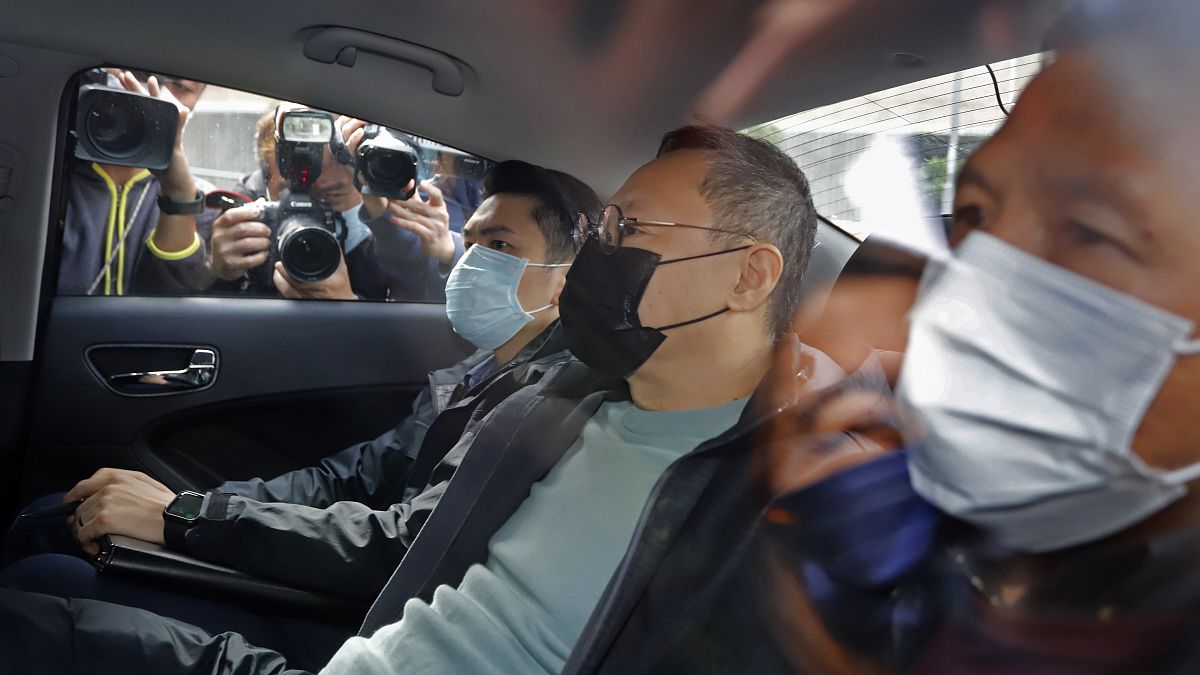53 former lawmakers and democracy activists were arrested in Hong Kong on Wednesday for allegedly violating a national security law imposed by Beijing.
The European Union has called for the immediate release of more than 50 former lawmakers and pro-democracy activists arrested in Hong Kong.
53 people were detained on Wednesday after being accused of violating a new security law imposed by Beijing last June.
The mass arrests were the largest move against the semi-autonomous region's pro-democracy movement since the law came into effect.
EU spokesman Peter Stano told a press conference that the arrests demonstrate that "political pluralism is no longer tolerated in Hong Kong," adding that the security law is being used to "crush dissent and stifle the exercise of human rights and political freedoms."
The EU has not ruled out sanctions against China, Stano said on Wednesday, stating that member states are currently "thinking about the best measures to take to react."
The latest crackdown comes just days after the bloc agreed to a business investment deal with China despite concerns about human rights violations.
Hong Kong's security minister said the arrests targeted those suspected "of overthrowing or interfering" with government duties.
Former lawmaker Lam Cheuk-ting filmed police at his house who told him he was “suspected of violating the national security law, subverting state power.”
At least seven members of Hong Kong’s Democratic Party — the city’s largest opposition party — were arrested including the party's chairman.
Former law professor Benny Tai, who was a key figure in Hong Kong's 2014 Occupy Central protests, was also arrested by police, according to local media reports.
Tai was a main organiser of primaries held in July that aimed to gain pro-democracy seats in the legislature.
All of the pro-democracy candidates in those unofficial primaries were arrested, according to tallies of Wednesday's reported arrests.
Joshua Wong, a prominent pro-democracy activist who is serving a prison sentence for organising an unauthorised protest last year, had his home raided, according to a tweet from his account.
Police also went to the headquarters of Stand News, a prominent pro-democracy online news site in Hong Kong, with a court order to hand over documents to assist in an investigation related to the national security law, according to a livestreamed video by Stand News. No arrests were made.
Hong Kong had already jailed several activists including Wong and Agnes Chow for their involvement in pro-democracy protests, and others have been charged under the national security law including media tycoon Jimmy Lai.
The security law criminalises acts of subversion, secession, terrorism and collusion with foreign powers to intervene in the city’s affairs with serious offenders facing a maximum punishment of life imprisonment.
The unofficial primaries held in July last year attracted more than 600,000 voters even though pro-Beijing lawmakers and politicians had warned the event could breach the security law.
Pro-democracy figures had hoped to use the vote to build support and win a majority of seats in the legislature, which they could use to vote against bills they deemed to be pro-Beijing.
Hong Kong leader Carrie Lam had said at the time that the election could be considered as subverting the state, an offence under the national security law.
Beijing also blasted the primaries as illegal, calling it a “serious provocation” of Hong Kong’s electoral system.
Following the handover of Hong Kong to China by the British in 1997, the semi-autonomous Chinese city has operated on a “one country, two systems” framework that affords it freedoms not found on the mainland.
In recent years, Beijing has asserted more control over the city, drawing criticism that Hong Kong’s freedoms were under attack.
The legislative elections, originally slated to be held in September, were later postponed for a year. Lam cited the health risk of the coronavirus pandemic, though the pro-democracy camp denounced the postponement as unconstitutional.
In November, all of Hong Kong’s pro-democracy lawmakers resigned en masse after four of them were disqualified, leaving a largely pro-Beijing legislature.
The arrests suggest that Beijing has failed to learn from its mistakes in Hong Kong that repression generates resistance, according to a statement from Human Rights Watch’s senior China researcher Maya Wang.
She said that "millions of Hong Kong people will persist in their struggle for their right to vote and run for office in a democratically elected government.”
